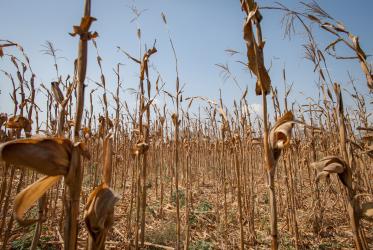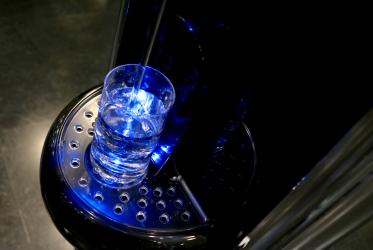Sermon outline for Environment Sunday in Hong Kong churches, 1/6 2003
Possible texts: Isaiah 55:1, 10-11 (-13), 1 Peter 3: 18-21, (Rev. 7:16-17), John 4:4-15
Today we celebrate Environment Sunday! We do it here in our congregation with Christians in some other churches in Hong Kong. We are happy that this is the second year we can point together to this part of Christian faith, which is becoming more and more important here and in the entire world! We are convinced that our Lord is deeply concerned with the present state of his creation, our physical world. This special Sunday God wants to challenge us: How do you human beings, created in my image, take care of my creation and the beautiful natural environment I gave you? The earth is the jewel in my universe.'
God's creation is now threatened in many ways, as all of us know. This world, where we are called to preach salvation given to us in Jesus Christ, might not be inhabitable by humans or might not be there at all after a few more generations. This is if we allow present trends to continue. Christians in many parts of the world are nowadays rediscovering their special role and responsibility in caring for the environment. This is simply because the Bible carries to us the deepest and best knowledge about the Creator, which is given throughout the centuries. Christianity and Creation belong together! Just start to look out for the combination of the two words Christian' and environment' on the Internet. You will find thousands of websites!
WATER OF LIFE - ENOUGH FOR ALL!' is our theme this year. It is about God's great and wonderful gift of water, so necessary for both our bodies and our souls. Without water there is no life. Nothing can survive, grow and flourish without water.
It is not surprising, then, that water is a very significant image in the Bible. Throughout the Old Testament, we learn that God provides his creation and us human beings with an abundance of waters. As a matter of fact, the earth could be called The Water Planet' since it consists of so much water. Even our own body consists of more than 70 % water! The river from Eden (was it not in present day devastated Iraq?) flowed abundantly and supplied the beautiful garden with plenty of fresh and healthy water.
The Psalms and the Proverbs and other books in the Bible also tell us about this wonderful abundance. Our text from Isaiah speaks about its life-giving abundance to sustain agriculture and food for the whole creation. It is very clear that God provides us with enough water - even in a desert situation of Biblical lands. We human beings must recognize God as the giver of all water. If we stop doing that, it will have serious effects. We will suffer the consequence of our own ignorance with polluted water and an unliveable environment. Already in the Old Testament it is clear that this abundant supply of water requires planning and care from the side of us human beings. Obedience and worship of God are necessary if we shall have enough water. God's economy is always an economy of abundance, but some circumstances require more planning.
After the Israelites follow Moses into the desert, they doubt God's abundance and complain to Moses that they are being brought into the wilderness to die of thirst.. Moses strikes the rock with his shaft and waters flow out of the rock.
The abundance of Exodus and Numbers has a simple formula. Worship God above all and you will have all that you need. "You shall worship God and I will bless your bread and your water" Exodus 23:25. Numbers 24:7 promises, "water shall flow from his [Israel's] buckets and his offspring shall have abundant water."
Many Psalms and Proverbs remind us of God's bountiful gift of water and our need to share that gift. Proverbs reminds us that the one who gives water will get water. Proverbs 25:21
For Christians, water certainly has both a direct real importance and a deep spiritual significance. Jesus is concerned with both!
Jesus' discussion with the Samaritan woman in the gospel for today deals with both these aspects of water. Jesus and the woman met at a deep well in Sychar. It was not a water tank or other device for gathering water. It was the ancient well of the city, well known by all, loved by all, cared for and respected by all, since all the inhabitants of the city were totally dependant on it. It was probably surrounded by some sheltering trees with fresh green lush leaves, with its roots deep down in the moist of the soil close to the well, where it could get the necessary water. Out of this well of Sychar came fresh and living water, gushing forth out of the depths.
The dialogue in this gospel text moves from ordinary water to the thirst for depth within us, a place where we can anchor our whole life, for ultimate meaning and satisfaction. All our thirst is a thirst within a greater one - for God! As he tells the woman at the well: "Those who drink the water that I will give them will never be thirsty. The water that I give them will become a spring of water gushing up to eternal life." (John 4:14) What a beautiful image! The simple gift of water on earth becomes the sacred gift of God from heaven - to cleanse, heal and transform, both our bodies and our souls.
Why is it that Christians today have so much trouble making the connection between the physical and spiritual aspects of water? How can we read all these things about water in the Bible and not see any relation to the alarming state of water all around us in the world?
Despite the abundance of water on the Earth, we humans have done a poor job of taking care of it. We abuse it for other purposes, We are diverting rivers and streams unnecessarily, we poison it, and waste it, indifferent to the consequences: too many people, too little water, water in the wrong places and in the wrong amounts. Did you know that 1.2 billion people in the world do not have access to clean safe drinking water, and 2.4 billion do not have adequate sanitation due to polluted waters?
This is why the United Nations has declared this year 2003 as The Year of Freshwater' and the churches devote this Environment Sunday to Waters of life - enough for all'. The World Council of Churches recently found out that 80% of all disease in poor countries is related to poor drinking water and poor sanitation. As much as 40% of the world's population goes thirsty every year nowadays, with some countries consuming more and more while others get less and less. In the USA, water usage continues to climb while it has been cut in half in the last 30 years in East Africa. Women and children in East Africa now walk an average of 21 minutes for each trip to collect water. How long time do you need to walk to find fresh and healthy water?
We know that here in Hong Kong the water situation is not at all as good as it should be if we look at the general standard of living we have achieved. There is a great change for the worse if we compare with Hong Kong 40 years ago. While we are privileged with fairly decent drinking water from our taps, the beautiful waters surrounding our territory are now shamefully polluted. Many people, locals and visitors alike have taken notice of it. This year more beaches (in the western side) have been declared unsuitable for swimming. Some people do not dare to swim anywhere in the territory. Victoria Harbor, the source and reason for the existence of our beautiful city, has become filthy and full of plastic bottles, bags and rubbish of all kinds.
Our drinking water is also threatened, even if the government is trying to secure clean supply from the mainland. Business interests are given priority over the most basic human right, the right of access to clean water. We can understand - and agree to a certain extent! - that economic development might necessarily have its environmental price. But other comparable world cities' like Singapore, London, New York and Stockholm, which all were surrounded by quite filthy and dirty waters 30-40 years ago, have all cleaned them up now. It is even possible to swim in many places right in the center of these cities nowadays! All agree: The driving forces behind the change are a combination of community action and government will. Why is this lacking in Hong Kong? Should not the churches as committed faith communities raise their voices so that the waters become cleaner also here?
As part of China, we Christians of Hong Kong should also be aware of the great problems concerning water on the mainland. This is very evident for everyone travelling in China. There is disastrous pollution of most of its rivers, e.g. in Guangdong and the Yellow River, causing sickness and shortened lives for tens of thousands of people. And the drastic lowering of the ground water level in large parts of northern China is now becoming a great concern not only for China itself but indeed for the whole world. It must also be said however that the central government seems to take environmental questions in a more serious way than the government of Hong Kong, even if the enforcement of the necessary laws on the mainland is not consistent enough. Their problems are however much more serious than ours. There are also a few interesting signs of environmental involvement among our fellow Christians there, mainly in the Roman Catholic Church.
Jesus came that all human beings might have life and have it abundantly. He clearly showed throughout his life that he cares both about our spiritual and physical well being. Abundant life is a combined spiritual and physical reality. The one who is touched by his Holy Spirit, the Spirit of Love, the fountain of living water cannot close the eyes to the physical water situation of the world and Hong Kong at present. Ho, everyone who thirsts, come to the waters: and you that have no money come buy and eat!' (Isaiah 55:1) What could we do in our congregation to make this become a reality in the full sense of abundant life for all?' Amen.
Some practical suggestions:
- We need to repent of our uncaring ways and attitudes towards creation and the natural environment in general and today in particular towards God´s wonderful gift of water.
- Let us start conserving water and bottle our own portable water as a small symbolic start.
- Make a donation or join a Green group.
- Participate in a beach clean up.
- Do not use running water for rinsing the dishes when you are washing up.
- Install an 80# water-saving showerhead, which reduces water consumption in your shower with 25 %.



